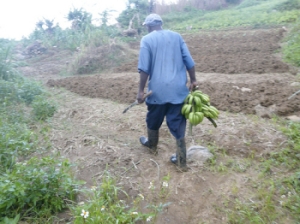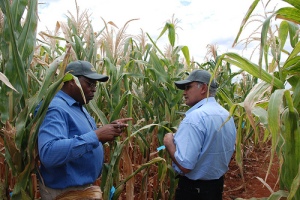Enterprises Acting As Businesses are the Most Powerful Force for Social Impact
This post is part of a three part series on which enterprise model is best placed to successfully improve livelihoods in the developing world. For a catch-up, please read the first post, and the second post.
I am walking up an incredibly steep hill, trying to keep pace with a most nimble giant. He is my grandfather, and I, at around 10 years old, can hardly keep up. As a farmer, I am getting a tour of his land and its produce. Thinking back, I never really remembered my grandfather buying much inputs – seed or fertilizer; he would largely use what was freely available.

Today, and for most of this week, I experience bursts of thrill meandering through maize stalks across Western Kenya (and occasional dismay at what hugs the soles of my shoes). Of course, I can’t help but remember my grandfather and my experiences with him and agriculture. Many of the farmers here buy seeds, and while they may not consistently use fertilizer, most that I have met are cognizant of its value.
The link between these two seemingly similar yet disparate experiences is the value placed by the farmer on the inputs needed for their farm. In other words, the perceived value of a product/service by a consumer, and their subsequent willingness to pay for that item/service. On one hand, with many Kenyan farmers, we have a consumer who is willing to invest in a product; on the other hand, my grandfather wasn’t.
Such dynamics are a primary factor that informs an enterprise model’s ability to successfully improve livelihoods.
By successfully, I mean the ability of an organization to reach the greatest amount of people (scale), while breaking even on an ongoing basis (financial sustainability).
At its core, regardless of a status (or misnomer) as a social enterprise, for-profit business, or some form in-between, the most ideal model is one which offers a livelihood-improving product/service that low-income individuals are willing to pay for in a format (lump-sum, monthly, etc.) that allows the organization to break-even on an ongoing basis.
In other words, the enterprise’s impact on livelihoods is a direct product of the enterprise’s well-being, abating the tension between financial sustainability and social impact. The enterprise improves lives by being a business, and acting like a business – not a charitable donor.
To bring to life this argument, an example would be helpful: the firm I work for, Western Seed Company (WSC).
WSC is in the business of growing and selling, among other products, hybrid maize seeds to low-income farmers. Hybrid seeds, which are not genetically modified, hold the potential to deliver up to 40% more yield, versus conventional farm-saved seed – the kind that my grandfather likely used. While not a panacea to a farmer’s challengers, high-yielding seed is a key input that helps improves the yield of farmer’s, their income, and their household’s ability to meet health, education and energy needs. By being able to sell a product consumers are willing to pay for, year over year, the firm has increased its consumer, serving hundreds of thousands of consumers. 
In other words, in being a business, and acting as a business, WSC has become a powerful force for addressing a host of pressing social issues, one of which is food security.
Surely, the firm and its ability to empower low-income farmers in the improving their livelihoods are not without its challenges. Challenges around sales and marketing, or growth strategies, and how these affect the ability of the firm to meet profit targets while supporting the small scale farmer still remain.
Yet, by starting from a consumer-centric perspective and delivering a good/service with a value that is both clear to the consumer and enables financial sustainability, WSC exemplifies the ability of an enterprise model that will empower lives.
An enterprise model that will, hopefully, enable other young men to see the lands of their own giants, and in turn, become giants of their own.

Shane talk to me about the picture !!!!!!!!! If u have more of that kind, please share.
Your Grandfather would have invested more in his products if he had the capital. He was committed to traditional farming where seeds planted were Farm- saved from previous harvest. Hence the yeild would gradually get less. In instances where Glen and I would get him Tins of Carrot Seeds from the Farm Store (not Hybrid) he would grow, reap and sell in the local Market. He would often give produce to friends and family members.
We need a Western Seed Company in Jamaica.